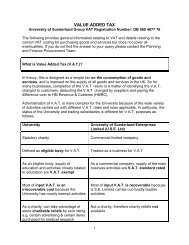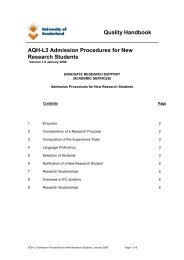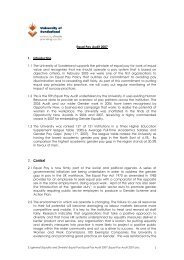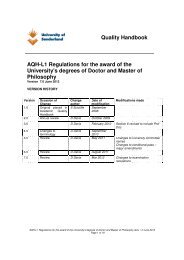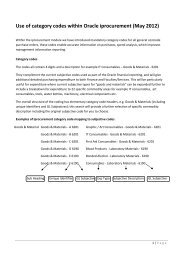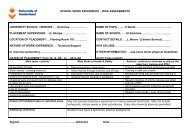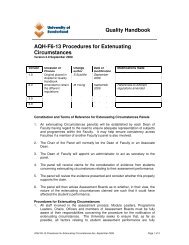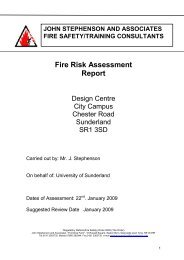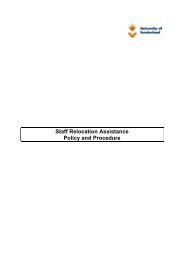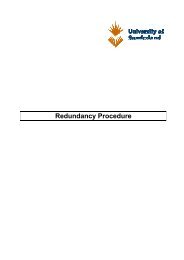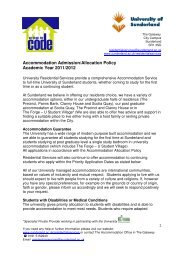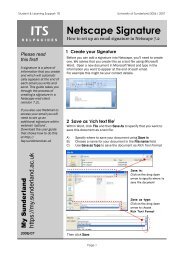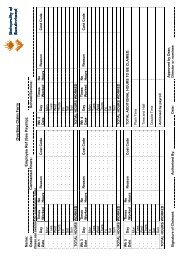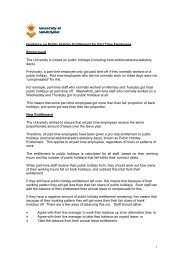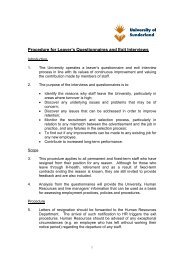University of Sunderland - Travel Plan Final 200510-1
University of Sunderland - Travel Plan Final 200510-1
University of Sunderland - Travel Plan Final 200510-1
Create successful ePaper yourself
Turn your PDF publications into a flip-book with our unique Google optimized e-Paper software.
<strong>University</strong> <strong>of</strong> <strong>Sunderland</strong> <strong>Travel</strong> <strong>Plan</strong> Update<br />
• Establishment <strong>of</strong> a new Sustainable <strong>Travel</strong> Environmental Action Group (EAG); and<br />
• Promotion and pr<strong>of</strong>ile raising through promotional travel days<br />
Key Survey Findings and Issues<br />
The 2009 staff and student travel to work surveys revealed some varied results. Between 2007 and 2009,<br />
there has been a 0.5 percentage point increase in staff cycling and walking to the <strong>University</strong>, with student car<br />
users down by 3.9 percentage entage points and students walking to the <strong>University</strong> increasing by 9 percentage<br />
points. However, there has been a 2.7 percentage point decrease in staff public transport usage and 4.4<br />
percentage point increase in staff car drivers, although the majority <strong>of</strong> this increase is due to an increase in car<br />
drivers with passengers. It should also be noted that any increases in car use and decreases in public<br />
transport use are representative <strong>of</strong> regional trends as the Tyne and Wear area has seen increased car use<br />
and decreases ases in public transport usage.<br />
The travel to work survey also revealed that 28.9% <strong>of</strong> staff car drivers and 26.6% <strong>of</strong> student car drivers<br />
currently live within 4 miles <strong>of</strong> the <strong>University</strong>, which indicates that there are a large proportion <strong>of</strong> car journey journeys<br />
which could be catered for by sustainable modes or public transport.<br />
The 2009 parking count survey data also confirmed that City Campus car parks are currently over capacity on<br />
most weekdays. Parking conditions are particularly difficult earlier in the week, with City Campus car parks<br />
14% over capacity on Tuesdays.<br />
The parking situation is expected to deteriorate further when the Ashburne Campus closes in 2011, with<br />
Ashburne car drivers transferring to the City Campus. If parking charges at the Univers <strong>University</strong> remain low<br />
(compared to equivalent higher education institutions) and parking capacity is reduced by 2012, this will result<br />
in City Campus car parks being up to 34% over capacity by 2012.<br />
If the <strong>University</strong> does not react to the findings from the trave travel l to work and parking count surveys as outlined<br />
above, then the <strong>University</strong> is likely to encounter the following problems:<br />
• Continued increase in single occupancy car use;<br />
• Increased pressure on City Campus parking with conditions worsening;<br />
• Increased congestion in and around the City Campus; and<br />
• Negative impact on the campus environment and safety<br />
Recommended Solutions<br />
It is essential that staff, students and visitors have the best possible experience <strong>of</strong> the redeveloped City<br />
Campus. There are a number <strong>of</strong> solutions which the <strong>University</strong> can implement to reduce single occupancy car<br />
use and minimise future parking demand. It is therefore recommended that the <strong>University</strong> increases the cost <strong>of</strong><br />
its parking charges in the 2010/11, 2011/12 and 2012/13 academic ye years. ars. There will be a significant increase<br />
for staff mandate holders, with the cost <strong>of</strong> these permits increasing to £295 per year by 2012/13. The cost <strong>of</strong><br />
pay and display and visitor parking rates will also increase. Revenue generated from increasing parking<br />
charges will continue to be invested a wide variety <strong>of</strong> sustainable travel measures measures, , something which the<br />
<strong>University</strong> has been extremely successful and proactive in over the last four years.<br />
In addition to implementing increased parking charges, the Universi <strong>University</strong> ty will also investigate complimentary<br />
solutions which could include:<br />
• Apply a restriction to the total number <strong>of</strong> parking permits issued to staff and students with permits issued<br />
on a needs basis;<br />
• Investigate the possibility <strong>of</strong> removing staff annual mand mandate ate permits completely, using only pay and<br />
display parking for both staff and students; and<br />
• Introduce a ‘Cash Out’ scheme, where car drivers could be compensated by the <strong>University</strong> by giving up<br />
their right to a parking space<br />
5087709/<strong>University</strong> <strong>of</strong> <strong>Sunderland</strong> - <strong>Travel</strong> <strong>Plan</strong> <strong>Final</strong><br />
<strong>200510</strong>.docx<br />
8



